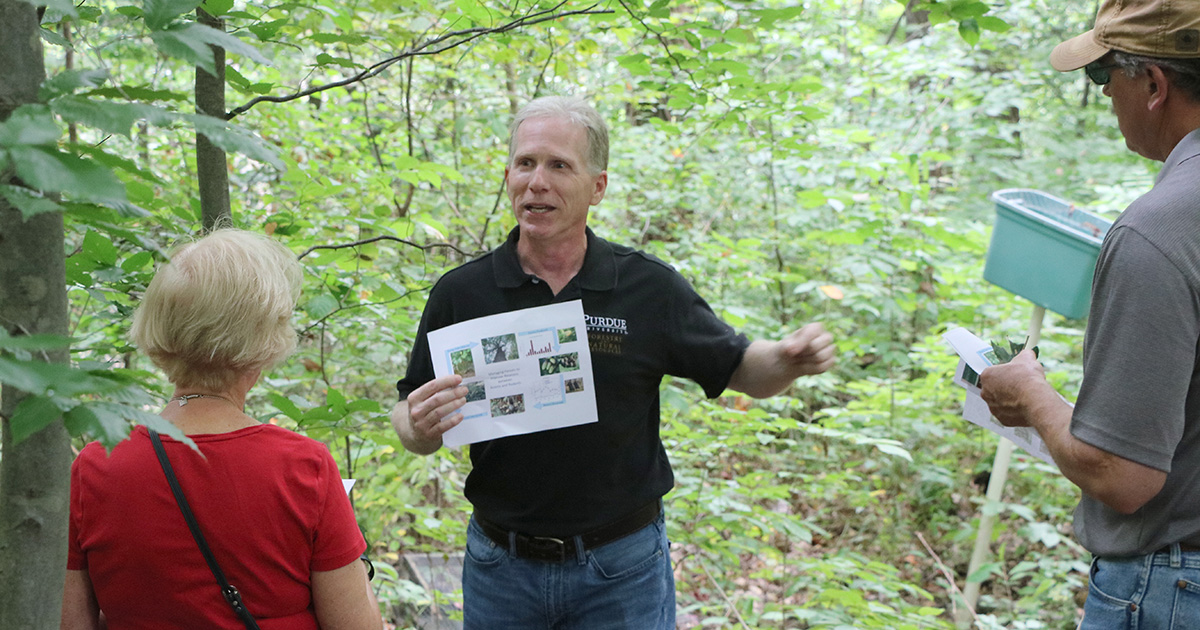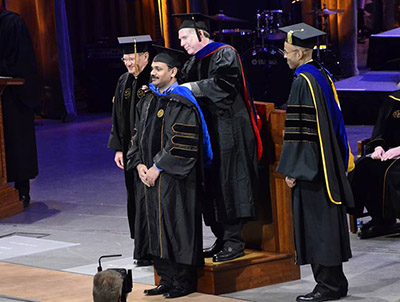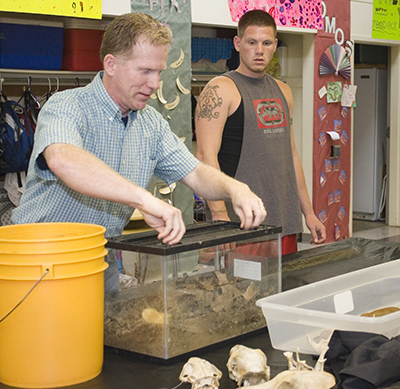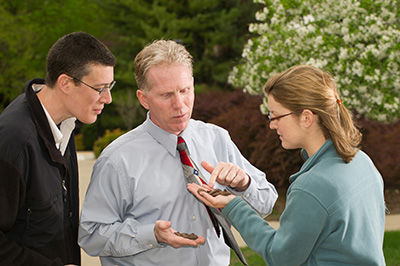Swihart Honored for Work in Mammalogy Education
 Dr. Rob Swihart, professor of wildlife ecology in the Purdue Department of Forestry and Natural Resources, has been honored for his work in mammalogy education with the Joseph Grinnell Award, presented by the American Society of Mammalogists.
Dr. Rob Swihart, professor of wildlife ecology in the Purdue Department of Forestry and Natural Resources, has been honored for his work in mammalogy education with the Joseph Grinnell Award, presented by the American Society of Mammalogists.
According to the ASM website, the Joseph Grinnell Award was established by its Board of Directors in 1996 to honor individuals who have made outstanding and sustained contributions to education in mammalogy over a period of at least 10 years. The award recognizes excellence in education in the broadest sense. It encompasses not only the traditional roles of teaching undergraduate and graduate students in academic institutions, but also educational activities such as production of materials for federal, state, or local agencies, public education through creation of museum displays, and enhancement or encouragement of education through stewardship activities.
“I am humbled and deeply appreciative to be chosen for such a prestigious award,” Swihart said. “I joined ASM as a student, grew up professionally within its welcoming environment, and established lifelong connections with fine scientists who are even finer people. Because of my longstanding involvement in ASM, I’m keenly aware that students and education have long been among the society’s top priorities. The Grinnell Award recognizes sustained contributions to education, and it’s an honor for me to be mentioned in the same breath with former Grinnell Award recipients, many of whom I know personally, and all of whom I admire.
“Just as meaningful to me was the realization that, unbeknownst to me, former students and a highly respected FNR colleague assembled the nomination on my behalf. It means a great deal to know that they valued my contributions enough to expend their time and talents for my benefit. Truthfully, it is more than enough reward to have former students, who have become friends and colleagues, attribute even a small part of their success to anything I might have said or done. To receive the Grinnell Award, too? That’s icing on the cake – really good icing!”
Swihart joined the FNR faculty in 1991 as an assistant professor and was promoted to associate professor in 1994 and full professor in 1998. He also served as department head of FNR from 2005 to 2016 following a year in an interim head role.
 In his career, he has supervised 12 master’s students, 20 PhD students and 13 postdoctoral research associates, many of whom are now mentoring the next generation of mammalogists. Swihart also has served on advisory committees for 36 more graduate students and as advisor for 60 independent undergraduate research projects.
In his career, he has supervised 12 master’s students, 20 PhD students and 13 postdoctoral research associates, many of whom are now mentoring the next generation of mammalogists. Swihart also has served on advisory committees for 36 more graduate students and as advisor for 60 independent undergraduate research projects.
Swihart currently teaches an undergraduate course, Statistics for Natural Resources (FNR 38400), and a graduate course, Quantitative Methods for Ecologists (FNR 64700). In addition, he has taught numerous courses from introduction to research to spatial capture-recapture analysis, wildlife responses to agriculture, methods in statistical ecology, methods for analyzing resource selection, wildlife ecology, vertebrate population dynamics, mammalogy, conservation biology and mammalian ecology.
His Quantitative Methods for Ecologists course is the final and most advanced course in a series of three ecological statistics courses, while his Statistics for Natural Resources course is one of the most challenging in the undergraduate wildlife curriculum. Despite the challenge, students often comment how useful it is and how much better prepared they feel to analyze data after taking it.
“When I started my PhD, I was most worried about my inexperience with statistical analysis,” said 2021 PhD alumnus Brandon Quinby, now a research scientist and conservation biologist with the Department of Fisheries, Wildlife and Environmental Science at SUNY Cobleskill. “This anxiety was further heightened at the thought of taking a course covering Bayesian statistics. From the beginning, Dr. Swihart eased my anxiety by making a difficult course approachable though his obvious dedication and passion for teaching. His course was one of my most difficult, however it also was one that forced me to grow the most over my graduate training. I currently use the information that I learned in his course on a daily basis, and I know that his mentorship has made me a better scientist.”
Dr. Thomas Gehring, professor of wildlife ecology at Central Michigan University, earned his PhD at Purdue under Swihart in 2000. Gehring, who has co-authored seven publications with Swihart on topics from predator-prey relationships to habitat fragmentation, long-tailed weasels and tree squirrels, said Swihart has a way of making course material and research questions more accessible.
“As a teacher, Rob has a gift in being able to distill complex topics, such as quantitative analysis, into a form that is understandable and can be applied to course or research questions,” Gehring said. “I experienced that first-hand as a student in his courses and later as a TA for his population dynamics course. Rob was always available after class for student’s questions on the material, and I observed the self-confidence grow among these students relative to the use of calculus and statistics. The passion that Rob expresses while teaching and pursuing research is also contagious. Rob gave me the freedom to explore areas of research that interested me, and he provided a dimension of thinking beyond and complimentary to my own, by expanding my level of thinking on topics. Rob also gave me the room and encouragement to grow and develop professionally. I felt he treated me like a colleague, even though his level of experience, intellect and expertise far outpaced mine. Rob was always humble and a mentor, a role model of how to be an effective teacher, a practicing scientist hungry for exploring the unknown.”
Recent undergraduate students agree that Swihart has impacted them through his passion, his humanity, his warm-hearted nature and his attentiveness and support for each student who takes his class.
“By combining mammalogy with statistics, Dr. Swihart has furthered my understanding of the mathematical and statistical sides of nature,” 2021 wildlife alumna Ashley McDaniel shared about the Statistics for Natural Resources course. “The impact he has had on my understanding of the natural world has been great and will be long-lasting. Through his teachings, I have developed a clear understanding of important statistical practices and developed a sound foundation for my future career in wildlife biology. Dr. Swihart's teachings have inspired me to foster my curiosity of the natural world and enabled me to have a deeper understanding of science. For this, I am very grateful.”
Another student said it was the encouragement and involvement of undergraduates in research that stood out about Swihart.
 “Outliers were one of the first concepts Dr. Swihart taught us in his statistics course,” she said. “He explained that outliers were data points that significantly differed from the rest of the observed data. After getting to know Dr. Swihart, I would argue that he is an exceptional outlier compared to other educators. Not only does he express unending enthusiasm for teaching and mammalogy, but he also actively reaches out to collaborate with students on university and state research projects. Many undergraduate students have difficulty getting their feet in the door when searching for professional opportunities. Dr. Swihart acts as a guiding hand through that challenging process.”
“Outliers were one of the first concepts Dr. Swihart taught us in his statistics course,” she said. “He explained that outliers were data points that significantly differed from the rest of the observed data. After getting to know Dr. Swihart, I would argue that he is an exceptional outlier compared to other educators. Not only does he express unending enthusiasm for teaching and mammalogy, but he also actively reaches out to collaborate with students on university and state research projects. Many undergraduate students have difficulty getting their feet in the door when searching for professional opportunities. Dr. Swihart acts as a guiding hand through that challenging process.”
A third student said Swihart’s passion for his field is contagious.
“His love for the natural world and the mathematical components that underlie its beauty is felt throughout his teaching, no matter the setting,” 2021 wildlife and forestry alumna Tabitha Olsen shared. “Dr. Swihart works with every single student to personally ensure their true understanding of the natural resources field and pushes his students to critically examine the interconnectedness of our planet. His aptitude and passion spill out into his work, instilling curiosity into anyone who takes one of his courses. He encourages students to get their hands dirty and embrace field work wholeheartedly, making the hardships of data collection all the more satisfying. Dr. Swihart opened a door for students such as myself to explore and experience science on a deeply personal level so that we could build our own connections with wildlife. Dr. Swihart is truly a fantastic wildlife professional, educator, and mammalogist.”
Dr. Elizabeth Flaherty, associate professor of wildlife ecology and habitat management at Purdue, has been a colleague of Swihart’s at Purdue since 2013, but first encountered his work as a graduate student who was citing his papers about squirrel dispersal and ecology in her thesis and dissertation. Flaherty noted the impact of Swihart’s professional mentorship to both herself as a colleague as well as to students.
“When I joined the faculty at Purdue, Rob was our department head and within my first year, he invited me to co-advise a PhD student and an undergraduate on field research investigating the ecology of Peromyscus spp. using agriculture fields,” Flaherty said. “I know that as an early professional mammalogist, I greatly benefited from the opportunity to learn how to effectively advise and mentor students while co-advising with him. Rob’s successful mentoring of students’ research projects is highly regarded at Purdue.
“Rob is making critical contributions to the training and development of our future mammalogists through his teaching across all stages of students’ education and professional development. He is devoted to teaching his students how to effectively ask and answer ecological questions, and his passion for both mammalogy and his students makes him an outstanding teacher and mentor.”
Dr. Jake Goheen, professor of zoology and physiology at the University of Wyoming, earned his master’s degree in wildlife science under Swihart in 2002. Goheen, who has co-authored eight publications with Swihart on topics ranging from the patch occupancy of North American mammals to seed production in deciduous trees and several themes related to North American red squirrels and gray squirrels, said he considers Swihart’s relatability as one of his standout characteristics.
“Conservatively I estimate that he has taught more than 1500 undergraduate students in courses like mammalogy, wildlife ecology, vertebrate population dynamics and statistics for natural resources,” Goheen said in his letter of support for Swihart’s nomination. “More difficult to quantify – but perhaps of greater importance – has been Rob’s investment in the individual student. Since 2008, I have been advising my own graduate students and I’ve found it to be challenging. So, I started asking myself, “what would Rob do?” Rob would start by first relating to his students as individuals by finding some common, non-scientific ground – kids, basketball, music, golf, dogs, vacations, etc. Rob is a well-rounded relatable person, and students gravitate to him because of it. This immediately nullifies the intimidation factor, puts students at ease and makes doing science easier and a lot more fun! In short, Rob recognizes that training graduate students isn’t a one-size-fits-all effort, which might seem rather obvious. However, recognizing this fact and tailoring one’s mentoring to accommodate it are not the same thing. It’s here that Rob is exceptional, if not unique.”
Dr. Kristen Page, Ruth Kraft Strohschein Distinguished Chair and Professor of Biology of Wheaton College, earned her PhD under Swihart in 1998, with her dissertation focusing on the ecology and transmission dynamics of raccoon roundworm. One of Purdue Agricultural Alumni Association’s 2020 Distinguished Ag Alumni Award honorees, Page notes Swihart’s impact on her own teaching and research.
“Collaborating with my Purdue mentors, like Dr. Rob Swihart, and my fellow graduate students helped me prepare for a career of collaboration with my students and many scientists all over the world,” Page said. “I am the educator that I am because of his mentorship and example. Dr. Swihart teaches by example and creates collaborative learning experiences both in the classroom and one-on-one. He empowers young scientists by helping them to discover their strengths and weaknesses - affirming their strengths until the  student becomes the expert (teacher), and addressing weaknesses through collaborative work and encouragement. The field of mammalogy has a stronger base of knowledge because of Dr. Swihart’s expansive work exploring the role of mammals in ecosystems. He is able to bridge disciplines because he approaches collaboration with respect and with a desire to learn from and with his collaborators. He taught me the power and importance of collaboration in science. The outcome is a much stronger and nuanced understanding of systems and the ability to ask increasingly better future questions.”
student becomes the expert (teacher), and addressing weaknesses through collaborative work and encouragement. The field of mammalogy has a stronger base of knowledge because of Dr. Swihart’s expansive work exploring the role of mammals in ecosystems. He is able to bridge disciplines because he approaches collaboration with respect and with a desire to learn from and with his collaborators. He taught me the power and importance of collaboration in science. The outcome is a much stronger and nuanced understanding of systems and the ability to ask increasingly better future questions.”
Swihart has received numerous awards for his teaching prowess over the years, but says the Grinnell Award is special due to its international nature, its recognition of his career impact and the fact that it comes from his colleagues in the mammalogy field.
“It stands out for many reasons,” Swihart said. “I’m a mammalian ecologist. I’ve devoted my entire career to the study of mammals, and to sharing my passion for mammals and ecology with students. I’m also a life member of ASM and consider it my principal professional home. Thus, it’s certainly a highlight of my career to be recognized by my ASM brethren for sustained contributions to education in my chosen field. It also merits mention that the list of past Grinnell Award recipients reads like a veritable dream team of mammalogists; I find it equal parts inspiring and intimidating to be included in this group!”
Swihart has earned FNR’s Outstanding Undergraduate Teaching Award four times (1993, 2000, 2021, 2022), as well as the William L. Hoover Exemplary Faculty Service Award in 2015, the Purdue Learning Community Academic Connection Award in 2017, and both the College of Agriculture and FNR’s Outstanding Graduate Educator honors in 2011 to name a few. Swihart also was listed as a Purdue University Faculty Scholar from 2003-08 and was named to Academic Keys’ Who’s Who in Agriculture Higher Education in 2003.
The Indiana Chapter of the Wildlife Society’s 2016 recipient of the Hoosier Wildlife Award also has been honored for his research, which has drawn in nearly $8 million in funding over the years. Swihart’s research focuses primarily on forest mammals and the topics of fragmentation ecology, plant-herbivore interactions, disturbance ecology and conservation biology. Wildlife covered in his more than 200 publications range from deer and bobcat to raccoons, cottontail rabbits, snowshoe hares, long-tailed weasels, Allegheny woodrats, voles, woodchucks, chipmunks, squirrels and mice to terrestrial salamanders, raptors and songbirds.
Swihart is currently the director and principal investigator of the Integrated Deer Management Project, which is a multi-year research partnership between FNR and the Indiana Department of Natural Resources Division of Fish and Wildlife, which aims to combine deer population and habitat condition information with public perceptions of deer and deer management to better inform white-tailed deer management in Indiana.
Swihart’s recognition by the American Society of Mammalogists is even more meaningful due to his long history of involvement in and giving back to ASM. He is the current chair of the Cameron Awards committee (since 2019) and has been a member of the Grants In Aid committee since 2018. Previously he was a member of the Education and Graduate Students Committee (1992-2009), the Student Honoraria Committee (1992-2004) and the Public Education Committee (1992-95).
“I will forever owe a debt to the established professionals of ASM who, 40 years ago, took an introverted, deer-in-the-headlights student under their wing, made him feel welcome, and cultivated in him a sense of belonging,” Swihart shared. “I’ve tried to pay it forward by serving student members in formal and informal capacities. Formal service has included reviewing proposals for support of student and postdoctoral research, making educational materials available, organizing informal meetings of students and established ASM members to facilitate networking, and serving as a student mentor during annual meetings. Informally, I was privileged to learn from the master of student inclusion, my PhD advisor and fellow Grinnell Award recipient Norm Slade. For the better part of 35 years, I either assisted Norm or led planning for an alternative dining experience (ADE) for students and others with neither the funds nor the attire to attend what was then a semi-formal ASM banquet at its annual meeting. The ADE, held at a pizza joint and featuring its own program (including a keynote address, always in a language other than English), was a transformative experience for countless student members who witnessed firsthand the society’s capacity for fraternity, hilarity, and humanity. I’m confident that the ADE served to create fond memories in and cement the loyalty of many student members to the society.”
Whatever else Swihart does in his illustrious career, his impact on students through teaching and research cannot be overstated.
“Dr. Swihart has certainly influenced my individual approach to natural resources work and mammalogy,” 2021 wildlife alumnus Chris Orpurt said. “Anyone who has met Dr. Swihart and listened to him teach can attest that there is an immediate sense of his passion for uncovering answers to the questions that exist in mammalogy. Since having class with him, I have worked as an undergraduate research assistant and when I was faced with complex questions, I would often remember Dr. Swihart’s passion for solving the unknown. This certainly served as motivation to come at the problem from every angle and with an open mind, a concept I learned most from Dr. Swihart. I believe that the memories I have of Dr. Swihart will follow me far into the future of my natural resources career and guide me as I learn and develop my knowledge further. I am certain that for many students, the class that Dr. Swihart teaches is among the most influential, and I believe this will hold true for students to come."






